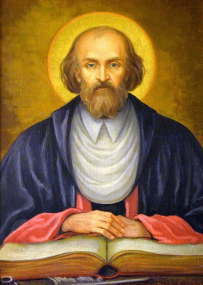
23 December
Optional Memorial
St. John of Kanty (1397-1473)
Priest
Born: June 23, 1397 Kęty, Oświęcim, Crown of the Kingdom of Poland
Died: December 24, 1473 (aged 83) Kraków, Crown of the Kingdom of Poland
Canonized: 1767, Rome by Pope Clement XIII
Major Shrine: Church of St. Anne Kraków, Poland
Patron of: Lithuania; Poland; diocese of Bielsko-Żywiec (since 1992); Jagiellonian University
Today the Church celebrates the Optional Memorial of St. John of Kanty (1390-1473), priest. Born in Kanty (Cracow, Poland), he taught at the university and became pastor of a parish. He was distinguished for his piety and love of neighbor.
COLLECT PRAYER
Grant, we pray, almighty God, that by the example of the Priest Saint John of Kanty we may advance in knowledge of holy things and by showing compassion to all, may gain forgiveness in your sight. Through our Lord Jesus Christ, your Son, who lives and reigns with you in the unity of the Holy Spirit, God, for ever and ever.
Things to Do:
- His relics are found in University College of St. Ann in Cracow.
- Read more about St. John of Kanty:
- Since this day falls so close to Christmas, in imitation of St. John, we could do some acts of charity for the poor who will be suffering and alone during this holiday season. Contact your local council or St. Vincent de Paul organization in your parish to find out what families are needy. Make a food and gift basket to present to this family.
- Another good work would be taking the family to visit a nursing home. This time of year can often be depressing.
- Take some time to learn a little about Poland and its culture and traditions.
- Serve some Polish food, like pierogies and kielbasa (Polish sausage). You can try to make these from scratch, or find them ready-made in your grocery store.
- Visit online the St. John Cantius Church in Chicago, run by the Canons Regular of St. John Cantius. Read about their patron saint.
- Recite the Vespers hymn to St. John Kanty, O Glory of the Polish Race.
St. John of Kanty
John Cantius was born in the year 1397 in the Polish town of Kanty (whence his surname). He became a professor of theology, then parish priest; soon, however, he returned to the professor’s chair at the University of Cracow. On foot he visited the holy places of Rome and Palestine. One day, after robbers had deprived him of all his effects, they asked him whether he had anything more. The saint said no, but hardly had they gone when he remembered having sewn some gold pieces inside his clothing; immediately he followed and overtook them. The robbers, astonished at the man’s sense of truthfulness, refused to accept the money and returned to him the stolen luggage.
To guard himself and his household from evil gossip he wrote upon the wall of his room (after the example of St. Augustine): Conturbare cave, non est placare suave, diffamare cave, nam revocare grave, i.e. “Guard against causing trouble and slandering others, for it is difficult to right the evil done.” His love of neighbor was most edifying. Often he gave away his own clothing and shoes; then, not to appear barefoot, he lowered his cassock so as to have it drag along the ground. Sensing that his death was near at hand, he distributed whatever he still had to the poor and died peacefully in the Lord at an advanced age. He is honored as one of the principal patrons of Poland.
Source: Catholic Culture